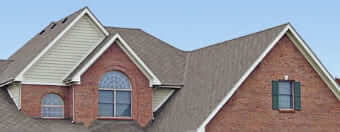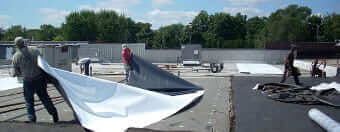from Sherriff Goslin Roofing
Choose your view:
Roof Repair or Replacement: 5 Factors to Guide Your Decision
When dealing with roof damage, homeowners commonly face the dilemma of choosing repairs or opting for a complete roof replacement.
This decision isn't always straightforward, as various factors—like the severity and location of the damage, overall roof condition, financial considerations, and potential impacts on energy efficiency—must be carefully looked at.
Five Factors that Determine Whether to Repair or Replace Your Roof
Understanding these factors helps homeowners avoid spending unnecessarily on short-term fixes or investing prematurely in a full roof replacement. Making the correct choice ensures lasting protection for your home while keeping costs manageable and preventing ongoing problems.
1. Age of Your Roof
One of the most important considerations is your roof's age. Asphalt shingles typically last around 20 to 25 years. Metal or tile roofs often remain functional for significantly longer. When your roof approaches the end of its expected lifespan, minor repairs become temporary fixes, and frequent problems will likely occur again.
On the other hand, if the roof is relatively new or in the middle of its lifespan, repairs usually make more sense financially. Simple fixes can quickly restore protection without substantial investment. A younger roof with limited issues doesn't need replacement unless extensive damage happens, making targeted repairs the more logical choice.
2. Extent of Damage
The extent of roof damage directly impacts whether repairing or replacing makes the most sense. Small, isolated issues, such as missing shingles after a storm or minor leaks, often just require straightforward repairs. These fixes prevent additional deterioration and quickly restore roof integrity at a modest cost.
However, extensive damage covering significant sections of your roof generally requires full replacement. Multiple leaks, structural damage from fallen branches, or widespread moisture infiltration demand comprehensive restoration. In such cases, repairs become increasingly ineffective, making replacement necessary to fully protect your home.
3. Cost Considerations
Budget concerns naturally influence decisions between roof repair and replacement. Short-term repairs typically carry lower immediate expenses. Fixing isolated damage remains affordable, extending roof functionality without significant upfront costs. For temporary issues or when money is tight, opting for basic repairs is an economically sound decision.
However, repeatedly repairing an aging or seriously damaged roof rapidly increases overall costs. The cumulative cost of multiple repairs can exceed replacement expenses in just a few years.
While a lot of factors go into the actual cost of your roof replacement, it is usually better to invest in a complete replacement. While doing so may initially seem costly, it often results in greater savings over time by eliminating frequent repairs.
4. Energy Efficiency & Comfort
Your roof significantly affects your home's energy efficiency and indoor comfort. Older roofs, especially those with deteriorating insulation or inadequate ventilation, often increase your heating and cooling expenses. If you're noticing steadily rising energy bills, frequent temperature fluctuations, or drafts indoors, there may be underlying issues with the roofing system.
Replacing an aging roof with a modern, energy-efficient one directly improves indoor comfort and reduces monthly energy costs. New roofing materials offer better insulation, more effective sealing, and ventilation improvements. While repairing minor roof damage might temporarily ease problems, a full replacement provides a long-lasting solution that directly boosts your home's energy performance and reduces future utility expenses.
5. Roof Material & Condition
Finally, consider your current roofing material and its overall condition when deciding between repairs and replacement. Certain roof materials, like metal, concrete, or clay tiles, can last several decades and withstand repairs more effectively. Minor maintenance on these durable materials often quickly restores functionality without needing a complete roof replacement.
On the other hand, asphalt shingles, especially if nearing their lifespan limit, tend to deteriorate rapidly once problems start emerging. Brittle, cracked, or curling shingles indicate widespread failure. Continuing to repair a failing asphalt shingle roof generally proves ineffective long-term, necessitating full replacement as the smarter financial decision.
Making the Right Choice for Your Roof
Deciding whether to repair or fully replace your roof involves multiple factors, including age, extent of damage, cost considerations, energy efficiency, and material condition. Minor repairs are cost-effective for newer roofs with isolated damage, offering quick solutions without major financial burdens.
However, for roofs nearing the end of their lifespan, experiencing extensive damage, or significantly impacting your home's comfort and energy efficiency, replacement becomes the more practical investment. Sherriff Goslin Roofing provides reliable guidance and trusted services, helping you make the best roofing decisions for your home's needs and budget.
Request a Roofing Estimate From Sherriff Goslin
The Sherriff Goslin team is here to help when you need entirely new roofing or repairs. From patching holes to full replacements, we handle it all. No matter where or how the damage happened, we can return your roof to its original condition.
We even offer financing options to help make your roofing repair or replacement more affordable. Contact us today to request a free estimate on roofing repairs anywhere in Michigan, Indiana, Ohio, or Florida.






